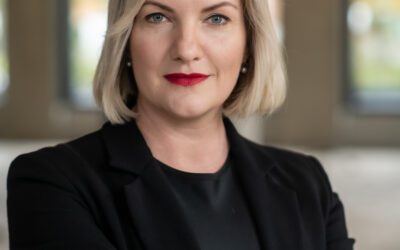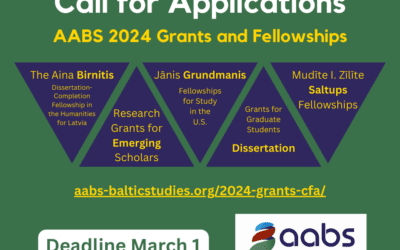The Association for the Advancement of Baltic Studies is pleased to announce that Jānis Juzefovičs, Maarja Merivoo-Parro, Charles Perrin, and David Trimbach have been awarded the 2021–2022 Research Grants for Emerging Scholars.
The research grants of up to $6,000 support early-career scholars in any field of the Baltic studies. Proposals are evaluated according to the scholarly potential of the applicant and the quality and scholarly importance of the proposed work, especially to the development of Baltic Studies. Funds may be used for travel, duplication, materials, equipment, or other needs as specified.
The 2021 applications were evaluated by the AABS 2021-2022 Grants and Awards Committee consisting of AABS VP for Professional Development Dr. Ineta Dabašinskienė, AABS President Dr. Daunis Auers, and AABS Director-at-Large Dr. Andres Kasekamp.
Making Sense of the Covid-19 Crisis: Information-seeking and Trust-making Strategies of the Baltic Media Audiences at the Times of the Coronavirus Pandemic
Jānis Juzefovičs, Rīga Stradiņš University
Drawing on qualitative audience research and survey data, this project seeks to explore meaning-making practices media audiences in Latvia and Estonia have been involved in during the Covid-19 crisis with special interest in the Baltic Russian-speaking media users. The project builds on my recent inquiry into media practices and media-related sentiments of the Baltic Russian-speakers amid the Ukraine crisis. The coronavirus pandemic has provided a unique opportunity to examine how strategies employed by these audiences to deal with complex and contradictory information flows during politically turbulent times are utilized (transplanted, adapted or elaborate new ones) in the context of a non-political crisis situation.
While still politicized, the Covid-19 crisis has been less ethno-linguistically charged in contrast to the explicitly political Russia-Ukraine conflict. Instead, the coronavirus pandemic has polarized the Baltic societies beyond the usual ethno-linguistic lines. The survey data demonstrates ethno-linguistic as much as socio-economic frictions in the attitudes people have taken towards the Covid-19 crisis. This invites us to study Russian-speaking audiences not isolated from the inquiry into the ethno-linguistic majority audiences. This is, however, not to downplay the particularities of the Russian-speaking media users that also justifies the focus of this inquiry on these audiences. What makes them distinct from members of the ethno-linguistic majority are their transnational information diets, as well as rich cross-border online and offline social networks. Their Russia-oriented media practices have generated lots of anxieties among the local governments conceived as a threat not only to social cohesion but also national security (Russia-Ukraine conflict) and public health (Covid-19 crisis).
Earlier observations, though, suggest that the popular among the local political and media elites reasoning based on the media effects paradigm may provide only partial explanation of the Covid-19 scepticism shared by these audiences. The study into the public media/society relations in Latvia has explained the rejection of the country’s public media on the part of the Russian-speaking audiences with reference to their mistrust towards the local political elite where the public media are seen by these audiences as being closely connected with the distrusted political establishment. In the crisis situation the popular anti-establishment sentiments may make this community particularly suspicious of the messages as provided by the local political and, by extension, media elite where the latter is seen as having close ties with the former.
At the same time the less ethno-linguistically charged atmosphere during the Covid-19 crisis may have shaped attitudes of the Russian-speaking audiences towards local media channels and information sources that at the times of political controversies are otherwise considered to be ideologically distant, biased and untrustworthy. What is more, in contrast to the physically distant conflict between Russia and Ukraine, the Covid-19 crisis is a proximate one where access to the local utilitarian information is crucial for one’s day-to-day living. This may have forced these audiences to alter their regular media practices in order to “survive” during the coronavirus pandemic.
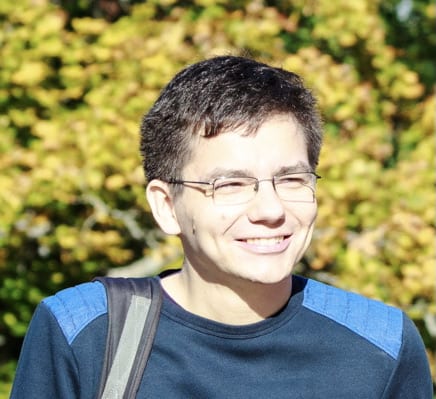
Jānis Juzefovičs, recipient of the AABS 2021–2022 Research Grant for Emerging Scholars
Dr Jānis Juzefovičs is a researcher at the Rīga Stradiņš University. His research interests focus on the study of media audiences in the Baltics. He obtained a PhD in media and communication studies from the University of Westminster in 2014.
Before joining the Rīga Stradiņš University, he has worked on a University of Tartu research project examining civic identity and transnational media practices of the Russian-speaking populations in Latvia and Estonia during times of geo-political uncertainty.
He is the author of Broadcasting and National Imagination in Post-Communist Latvia: Defining the Nation, Defining Public Television (2017, Intellect).
Spontaneous Finnish Humanitarian Aid as Catalyst for Independent Estonia: From a Personal Touch to the Success of a Nation
Maarja Merivoo-Parro, Baltic Heritage Network
The last five years of Soviet rule marked by perestroika and glasnost enabled Estonians not only to communicate their dissent, but also to build relationships with people on the other side of the Iron curtain. One of the first types of contacts to start popping up were those with neighboring Finns.
Spontaneous unofficial person-to-person networks sprung into action delivering food, medicine, clothes, toys, and technology to Estonia. This gave people a “taste of freedom” in a very direct way. It not only helped to kindle the fire of pro-independence movements, but also provided a great starting position for the budding country and might account for some of the surprising success it has had during subsequent decades.
Finnish humanitarian aid to Estonians during the re-independence era is among some of the most basic narratives in Estonia, but there is hardly anything researched or written about it. More than thirty years have passed since the first contact was made and some of the women and men in the front lines of this “diplomacy of the people” have begun to fade away. This project aims to zoom in on two localities at the heart of the exchange to create the foundation for a book manuscript.
Dr. Maarja Merivoo-Parro is dedicated to exploring the history of mentality and the crossroads of culture and politics. She divides her time between research, teaching, and work in the media.
Dr. Merivoo-Parro has her own TV show “Center for Curiosity” and hosts programs on both Estonian and Latvian public radio. She is also active in the non-profit sector as a board member of Baltic Heritage Network and Estonian Diaspora Academy.

Maarja Merivoo-Parro, recipient of the AABS 2021–2022 Research Grant for Emerging Scholars. Photo by Krõõt Tarkmeel.
Forgotten Prisoners of the Tsar: East Prussian Deportees in Russia during World War I
Charles Perrin, Kennesaw State University
The research that I will conduct as the recipient of an AABS Research Grant for Emerging Scholars is for the writing of a book-length manuscript. The topic is a forgotten story from World War I: the deportation of thousands of civilians from East Prussia, a province of Germany, to Russia by soldiers of the Russian army. Between August 1914 and March 1915, about 13,600 inhabitants of East Prussia, including 4,000 women and 2,500 children, were deported to Russia. This multiethnic group, which was composed of Lithuanians, Germans, and Masurians (Poles who belonged to the Lutheran faith), spent the war, and, in some cases, part of the Russian civil war that followed, interned at sites throughout Russia under very harsh conditions. Only 8,300 returned. In the memory of the Lithuanian and German publics, the deportation of East Prussian civilians has been forgotten because it pales in comparison to two greater tragedies that took place soon afterward involving the same ethnic groups: the mass deportation of about 111,000 civilians from Soviet-occupied Lithuania to sites in the Soviet Union and the flight and expulsion of about eight million people from the eastern part of Germany to the West during and after World War II.
Although the suffering that the deportees from East Prussia endured during their internment was sometimes met with indifference, it also generated a great deal of sympathy. They received assistance from local residents at internment sites, governments, and private relief organizations. Chief among them was the United States government, which represented German interests in Russia from August 1914–February 1917 and assisted deportees with funds provided by the German government. By agreeing to distribute this money the United States was participating in a humanitarian relief operation. This may have been the first time that the United States participated in such an operation.
Few scholars have shown an interest in the deportation of East Prussians civilians during World War I. There is no book-length investigation of this topic. Contemporary accounts of the deportations in Lithuanian and German, and the relatively few scholarly works that have been published on the subject usually focus narrowly on the experiences of a single ethnic group among the deportees, either marginalizing or completely ignoring the presence of other ethnic groups. Using published and archival sources in seven languages (English, German, Lithuanian, Russian, Polish, French, and Italian), my book will challenge these accounts of the deportations by going beyond the paradigm of national suffering and, more broadly, correcting some misconceptions about civilian internment during World War I. It will show that civilian prisoners were not only held in internment or concentration camps during the war and deportation was not always “synonymous with concentration camps.” Like the much larger group of enemy aliens in Russia, most deportees from East Prussia appear to have been interned in cities, towns, and villages. The book will also argue that the deportation of civilians from Russian-occupied East Prussia was not genocide.
Dr. Charles Perrin is a Part-Time Assistant Professor at Kennesaw State University in Georgia. He earned his Ph.D. in History from Georgia State University in 2013 and previously worked for the National Archives and Records Administration in Washington, D.C.
His research focuses on several themes in the history of modern Lithuania, including the national movement in the late nineteenth and early twentieth centuries, anti-Semitism, and deportations during World War I.
During the 2017-2018 academic year he was a Visiting Fulbright Scholar at Vytautas Magnus University in Kaunas, Lithuania and Project Manager for the creation of the traveling exhibit Over the Ocean: A Century of Friendship between Lithuania and the United States.
He is currently working on a manuscript titled “Forgotten Prisoners of the Tsar: East Prussian Deportees in Russia during World War I.”
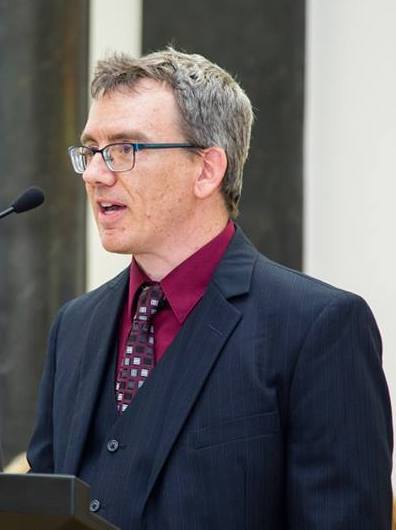
Charles Perrin, recipient of the AABS 2021–2022 Research Grant for Emerging Scholars
Sea-stonia: Exploring Estonians’ Sense of Place of the Baltic Sea and Seaside
David Trimbach, Oregon State University
The Baltic Sea (Läänemeri) anchors and geographically helps define the Baltic Sea region. The Baltic Sea has long connected communities, cultures, economies, and polities, illustrating the crucial role of the sea and seaside within regional affairs and local human-environment interactions. This is particularly the case for Estonia, with its nearly 3,800 km of marine shoreline and over 1,000 islands. Well before Estonia’s technological prowess and the emergence of e-stonia, there was and has always been what one might call Sea-stonia, an area and place-based community deeply connected to the Baltic Sea and seaside, and reflected by a maritime identity and culture. Building upon Estonia’s lengthy shoreline and deep coastal connections, this project will examine the relationships among Estonian residents, the Baltic Sea, and seaside.
The sea and seaside have long been places of community, refuge, sustenance, sacredness, and even danger for Estonians. The seascape, coastal landscape, and their inherent liminality are considered integral among Estonia’s coastal communities, as demonstrated by Estonia’s coastal foodways, maritime culture, and history of protection of coastal forests and meadows, which have been sites of important cultural, spiritual, and economic practices. Estonians’ maritime culture and connections were disrupted under Soviet rule (1940-1941, 1944-1991), as small boats were destroyed, individual fishing was banned, commercial fishing was coopted as a state industrial enterprise, and coastline access was regulated. Although disrupted, Estonia is reviving its maritime culture, identity, and connections, including through recreational activities, local fisheries, coastal ecosystem restoration, and tailored maritime institutions, forums, or events. While this revival takes shape, barriers and challenges remain. The legacy of the Soviet occupation’s impacts on maritime culture continues to be reflected in the general lack of sea-related activities among residents. Additionally, coastal development, seawall installation, and climate change impacts, like sea level rise or water temperature increases, are altering marine ecosystems and coastal landscapes. Such changes are already reflected by the Baltic Health Index (BHI), a collaborative, repeatable, and transparent assessment tool aimed at providing ecological and social indicators of sea health status. While monitored, these changes have stark implications for Estonia’s landscapes and natural areas, but also Estonians’ relationships to the sea and seaside. For example, place change sparked by environmental degradation or landscape modifications, can alter how people feel, think, interact, and bond with place. Gauging people’s sense of place, or place-based connections, identities, and meanings, can ensure places of meaning, bonding, or significance are identified, prioritized, and protected, particularly as place changes emerge or intensify.
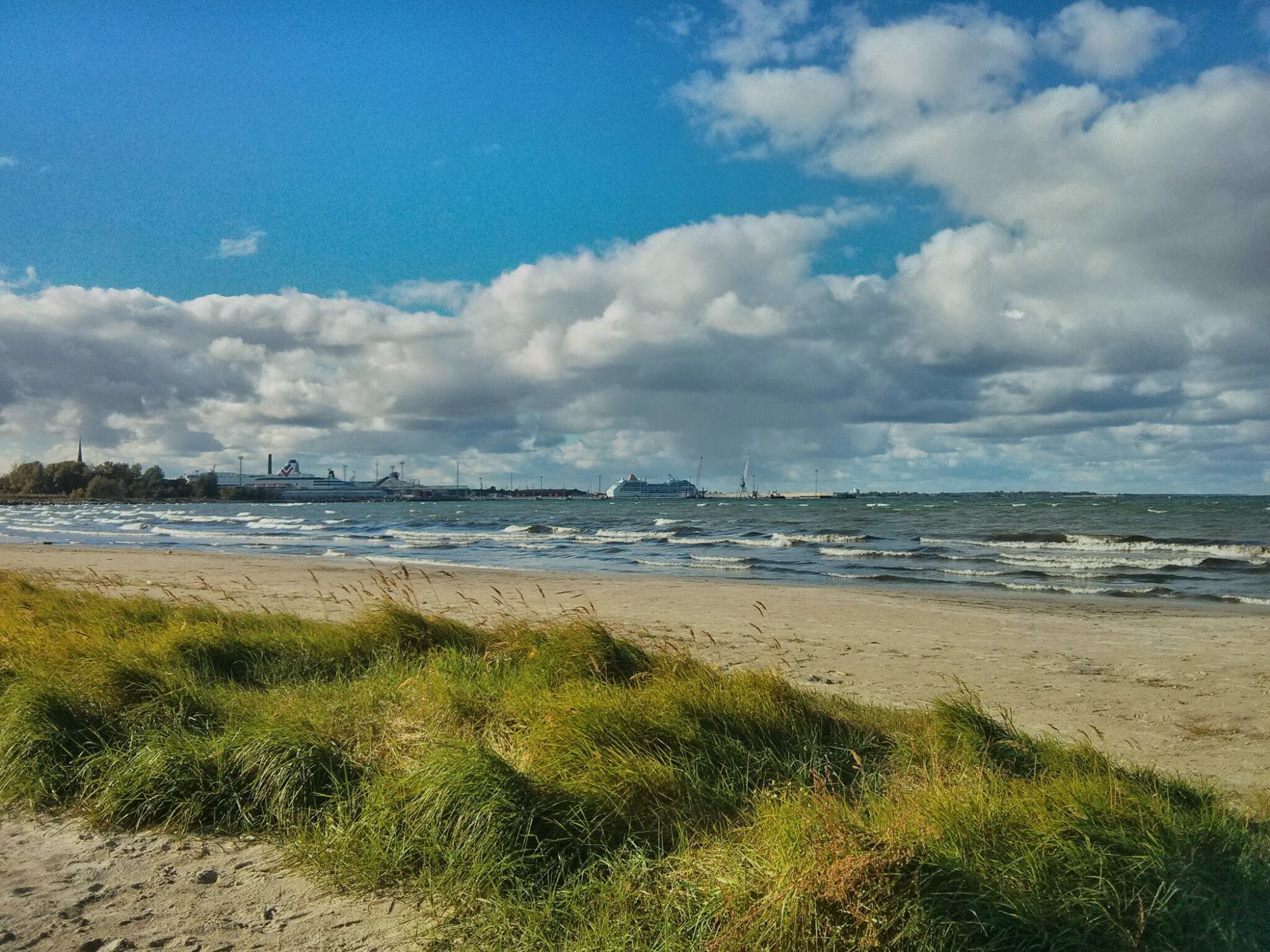
The Coast of Estonia. Photo by David Trimbach.
This sense of place study will gauge Estonian residents’ connections and meanings to the Baltic Sea and seaside. This year-long (12 months) project will include multiple methods, including a multilingual electronic survey and series of interviews that will focus on Estonia’s seven coastal counties. The blend of methods and data collection techniques will provide a diverse set of rich quantitative, qualitative, and visual data.
This study will demonstrate individual residents’ sense of place, which can be used to understand Estonian people-place relationships, assess residents’ human wellbeing, predict behaviors or responses to place change, and inform both scholarly research and applied policy or planning. This project’s findings will complement current BHI efforts, specifically BHI’s sense of place indicator, which is focused more on monitored observable species and special places, and does not include people’s subjective connections, meanings, or identities associated with the Baltic Sea or coastal areas. This project will directly build upon recent BHI work and the research of Dr. Anu Printsmann (Tallinn University), among others, who have examined Estonian coastal landscapes and communities. Project findings will be disseminated through peer-reviewed articles focused on Estonian sense of place, place change, and coastal landscapes. Findings will also be presented at future conferences, including the 2022 AABS Conference and shared with Estonia’s Maritime Museum (Meremuuseum). Beyond academic products, this work will inform Estonian landscape and coastal decision-makers, particularly climate change mitigation practitioners and coastal planners, as this project’s findings will illustrate how, where, and/or why residents connect and interact with the sea and seaside. Overall, this project will expand research on Baltic coastal landscapes and communities, and further enhance the interdisciplinarity of Baltic Studies.

David Trimbach, recipient of the AABS 2021–2022 Research Grant for Emerging Scholars
Dr. David J. Trimbach is a Research Associate in the Department of Fisheries and Wildlife at Oregon State University (OSU). Dr. Trimbach received his Ph.D. in geography from the University of Kansas (2016) and has studied at or conducted research through Tallinn University (2010), the University of Tartu (2012), and Narva College (of the University of Tartu) (2013). He is a trained human geographer and interdisciplinary social scientist, who primarily works in collaboration with public agency, nonprofit, and/or community partners on projects aimed at addressing shared policy-relevant problems. He currently works in collaboration with the Puget Sound Partnership, a Washington public agency based in Tacoma, Washington, on projects concentrated on social science integration within ecosystem recovery and coastal management.
Dr. Trimbach’s work has largely focused on the Baltic and Salish Sea regions. He has a diverse range of research interests, including: sense of place and human-environment interactions; environmental infrastructure and coastal management; migration, inclusion, and citizenship; and public policy and governance. His doctoral work focused on Estonia’s Russian-speaking community with an emphasis on the City of Narva, and much of his current work examines coastal residents’ connections to landscapes and the natural environment in the Pacific Northwest. While his work is interdisciplinary and encompasses a diverse range of interests, his research largely aims to untangle the complex relationships between people and place. As a community-oriented, place-based, and policy-driven scholar, his research seeks to explore and foster more equitable and vibrant communities.
Other Grants and Fellowships News
Vanished Lands: Book Publication Subvention Report by Laima Vincė Sruoginis
The Association for the Advancement of Baltic Studies (AABS) is pleased to recognized the successful conclusion of a Book Publication Subvention Grant awarded to Peter Lang Publishers for publishing the book Vanished Lands: Memory and Postmemory in North American...
Elīna Vikmane Birnitis Fellowship Report on Advancing Cybermuseology
AABS is pleased to recognize Elīna Vikmane for the completion of her dissertation "Advancing Cybermuseology: Diffusion of digital innovation in Latvia’s museum sector," for which she received the 2022–2023 Aina Birnitis Dissertation-Completion Fellowship in the...
AABS 2024 Grant and Fellowship Applications Open
Call for Applications AABS 2024-2025 Grants and Fellowships Research Grants for Emerging Scholars The Aina Birnitis Dissertation-Completion Fellowship in the Humanities for Latvia Mudīte I. Zīlīte Saltups Fellowships Jānis Grundmanis Fellowships for...


